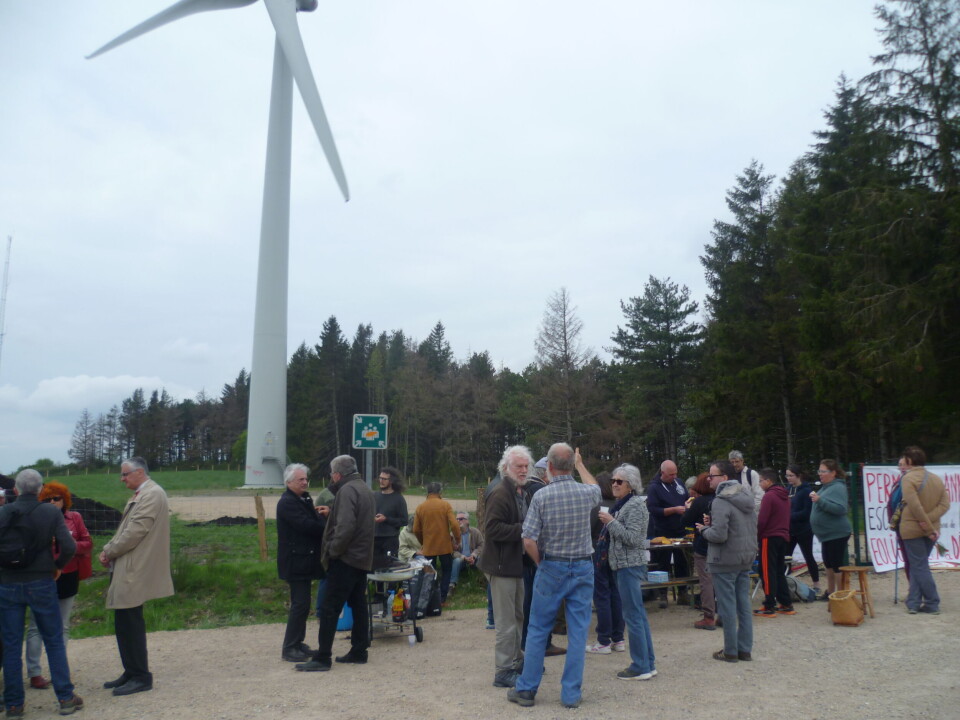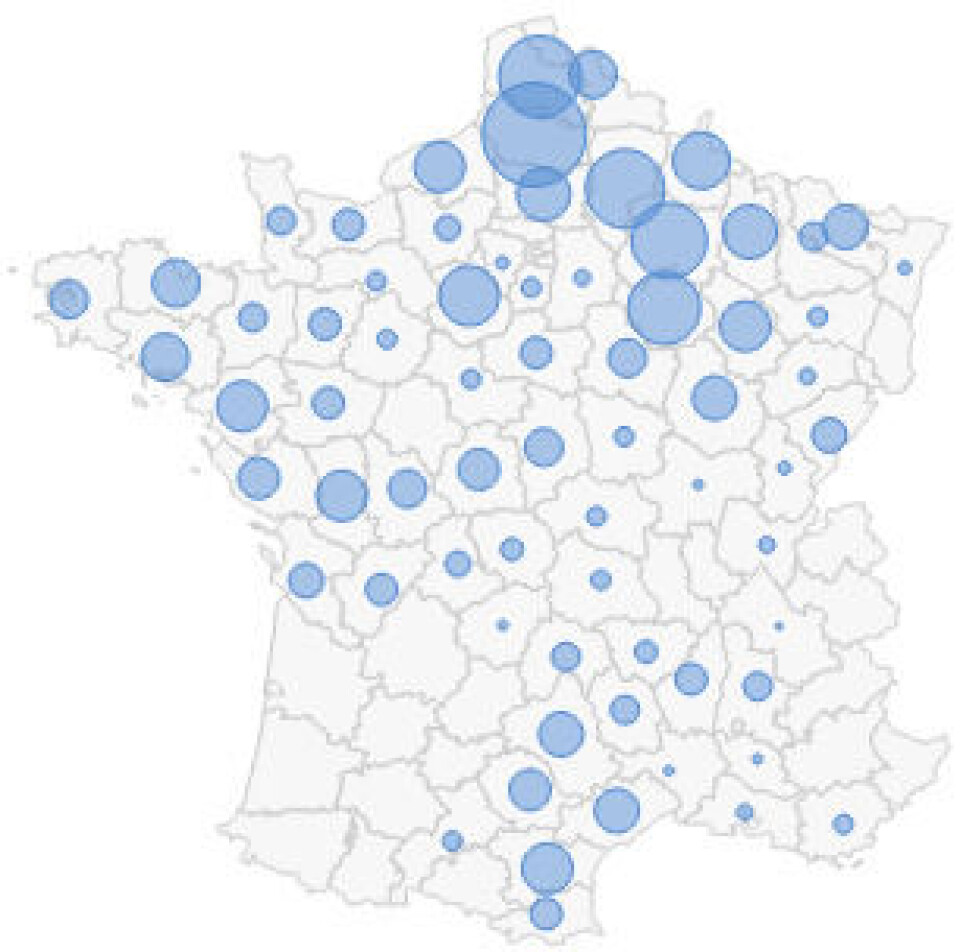-
Key Alpine pass to reopen this summer after €6m repairs
The col d'Allos in Alpes-de-Haute-Provence has been closed since 2023 due to severe weather
-
Why 500,000 people in France will soon be getting a call from health officials
A new campaign will target certain individuals with particular health conditions
-
Receive a book and a rose: France prepares to celebrate its independent bookshops
The 27th edition of the Fête de la librairie indépendante will take place tomorrow (April 26)
French court orders 'historic' demolition of seven wind turbines
Windfarm opponents are claiming a major victory after Hérault court ruled that the turbines must be demolished as they were built without the correct permission

Marjolaine Villey-Migraine, of VPPN Collectif 34-12, a group of 65 associations, said the Montpellier tribunal ruling was historic: “It is a first in France and will become a precedent for future cases.”
The court ordered that the 93m turbines at Bernagues in the Grands Causses in Hérault must be demolished, even if the owners launch an appeal.
They started producing power in 2016 but the next year the Conseil d’Etat, France’s highest administrative court, rejected the planning permission.
VPPN lawyer Nicolas Gallon said it was rare to win such a case. He said: “The technology is relatively new, so there have not been very many cases, and to order demolition and the costs that implies shows our arguments are solid.”
Energie Renouvelable du Languedoc, part of building group Valeco, was given four months to restore the site to its original state with a €9,000 penalty for each day over deadline. VPPN says the turbines are a danger to the environment.
Ms Villey-Migraine said: “They are on top of a mountain, in a region with protected species including golden eagles.
'One young eagle was killed by a turbine and the death of a cinereous vulture led to an order for the turbines to turn only at night'
"There are also restrictions due to bats. Other turbines on the mountains threaten protected species, but these were the only ones we could challenge in the courts over the building permit.”
Rabbits and rodents are drawn to the recently dug sites and this is a fatal attraction for eagles, which fly at the same height as the turbine blades.
Ms Villey-Migraine is confident of defeating Valeco’s appeal: “Our arguments are strong – like a house, if you build without a permit, it is risky.” She said turbines were not popular. “We are in Fédération Environnement Durable (FED) and its 1,300 associations are all fighting windfarms.
“We do not think they produce enough power to save the planet. If more homes changed from electric heating to green options, we would not need to produce as much electricity in the first place.”
Valeco is to appeal against the ruling and said: “We are extremely surprised by this unexpected decision, which will have serious consequences for our Montpellier business.”
Anti-windfarm group FED has estimated the demolition cost at €900,000 for a 3MW turbine – and Bernagues has seven turbines totalling 16MW.
At Angoulême, Charente, another case is due to be heard where turbine firm Eolfi is said to be claiming €14million in damages from a vineyard owner at Auge-Saint-Médard after he changed his mind about allowing a turbine on his land.
The owner said he had been misled on the turbine size, believing it to be small. After signing, he was told it would be the largest, at 186m. Eolfi has not replied to a call.
Too few sites and too much resistance hit new plans
France aims to increase its use of renewable energies to produce a third of its power by 2030 and sees wind turbines as a key weapon.
It plans to double the number of land wind turbines by 2028 – needing 6,500 new masts – but the renewable energy monitor EurObserv’ER says it is unlikely to succeed because of the difficulty of finding new land to build on.
Production was already down in 2020 due to the health crisis, but 47% of the country is inaccessible to new masts due to civil and military air traffic and heritage and nature protection sites.
The EurObserv’Er report says it is getting more and more difficult to find sites because of a lack of acceptance by the general public, “a situation windfarm professionals are only too well aware of”.
Hauts-de-France (4.9GW) and Grand Est (3.9GW) regions have more than half of the total and do not want any more. Hauts-de-France president Xavier Bertrand has called for a moratorium in his region.

Occitanie, Centre-Val de Loire, Bretagne, NouvelleAquitaine and Pays de la Loire also have totals above 1GW. Ile-de-France, Provence-AlpesCôte d’Azur, Corsica and overseas departments have the fewest. Smallest of all is Isère, which has just 3MW of production.
One option for expansion is to upgrade current sites with higher-performing turbines, but it is not possible on all windfarms, as they already have restrictions due to their position, which may be near to sensitive radars, for example.
Another is to develop offshore wind farms, which can be much larger in both power and number of masts.
The first marine turbines are expected to be in operation at Saint-Nazaire by the end of 2022 and France plans 1GW of extra production each year after that. Six are in development, with Fécamp, Saint-Brieuc and Dieppe/Le Tréport due to join the grid in 2023, Courseulles-surMer and Iles d’Yeu et de Noirmoutier in 2024, and Dunkirk in 2027.
Wind power produced 8.9% of electricity in France in 2020, up from 6.3% in 2019. France is Europe’s fourth biggest producer of wind energy, behind Germany, the UK and Spain, for energy produced, but 13th in the percentage contribution to the national grid. In 2019, 47% of Denmark’s electricity was produced by wind, 33% in Ireland, and 24.6% in Germany.
Solar power produces far less and made 2.9% of grid electricity in 2020. EurObserv’ER says France will need to raise production of solar parks more than three times faster than now to achieve aims for 2023 (20.1GW) and for 2028 (between 35.1 and 44.GW).
Hydro-electric is the biggest source of renewable energy: 13.9% of power here in 2019. It is the sector seen as most likely to achieve the aims set out for it, mostly by upgrading existing sites.
Related stories
Floating wind farm coming to French seas in 2022
























